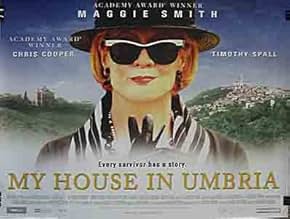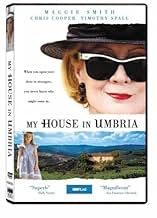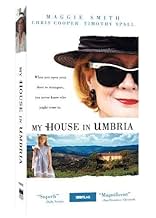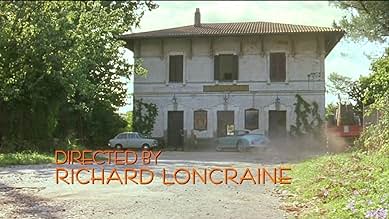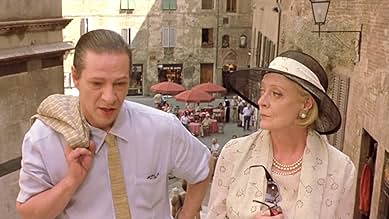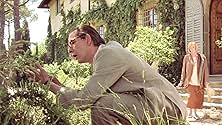AVALIAÇÃO DA IMDb
6,9/10
3,9 mil
SUA AVALIAÇÃO
Adicionar um enredo no seu idiomaAn unlikely group of people find solace and friendship after being thrown together in the wake of a terrorist attack.An unlikely group of people find solace and friendship after being thrown together in the wake of a terrorist attack.An unlikely group of people find solace and friendship after being thrown together in the wake of a terrorist attack.
- Direção
- Roteiristas
- Artistas
- Ganhou 1 Primetime Emmy
- 4 vitórias e 27 indicações no total
Alison Cameron Adam
- General's Daughter
- (as Alison Adam)
Vittoria Colonna
- Young Woman
- (as Vittoria Colonna Di Stigliano)
- Direção
- Roteiristas
- Elenco e equipe completos
- Produção, bilheteria e muito mais no IMDbPro
Avaliações em destaque
Having just seen this film in the cinema, I have to say it didn't flag at all, and it was graced by one of Maggie Smith's greatest performances - and which fully deserved her Emmy award. The film dramatises the necessary illusions with which we need to live our lives. For Emily Delahunty, alcohol and the escapism of the romance fiction she writes are the props to her very existence. To keep sane the illusion of happiness sometimes is necessary to keep going. And yet, out of tragedy comes the hint of salvation: some kind of family, and a girl who becomes a symbol of how she can have hope for the future. This is not a cosy film, as some misguided critics have labelled it. It is not gardens, Italy, cups of tea: it is a film of illusion, escapism, isolation and the human spirit in the face of tragedy and death. Released in the UK after the quaint "Ladies in Lavender" it was unfortunately seen by the critics as exactly the same kind of film - and so missing the point completely.
Playing the troubled alcoholic, a vulnerable ageing romance novelist, Smith is on amazing form. Never mannered, she is perfect in her second role in a William Trevor novella (her first was in the 1984 "Mrs Silly" for ITV in the UK, for which she was nominated for a BAFTA). Using those expressive eyes, and a crushed, occasionally slurred voice, she draws you into the film. If this makes me sound like a Smith groupie, I have to point out that I disliked intensely this actress's mannered caricatures in such films as "Tea with Mussolini" or "Washington Square" (though, faced with the awful scripts, maybe she decided just to push it for laughs...). That is why she deserves recognition for this film: she reminds us that, with the right material, she can be the best - and not just the witty old bat in "Gosford Park" or the the stern teacher in "Harry Potter". After Smith's Emmy award, it was criminal that Meryl Streep robbed Dame Maggie at the Golden Globes for her raiding of the dressing-up box in "Angels in America".
For the supporting cast, Ronnie Barker, Timothy Spall, and Chris Cooper are all superb: understated, natural, and working in a brilliant ensemble. They have such rapport with Smith that the film just whizzes by.
Playing the troubled alcoholic, a vulnerable ageing romance novelist, Smith is on amazing form. Never mannered, she is perfect in her second role in a William Trevor novella (her first was in the 1984 "Mrs Silly" for ITV in the UK, for which she was nominated for a BAFTA). Using those expressive eyes, and a crushed, occasionally slurred voice, she draws you into the film. If this makes me sound like a Smith groupie, I have to point out that I disliked intensely this actress's mannered caricatures in such films as "Tea with Mussolini" or "Washington Square" (though, faced with the awful scripts, maybe she decided just to push it for laughs...). That is why she deserves recognition for this film: she reminds us that, with the right material, she can be the best - and not just the witty old bat in "Gosford Park" or the the stern teacher in "Harry Potter". After Smith's Emmy award, it was criminal that Meryl Streep robbed Dame Maggie at the Golden Globes for her raiding of the dressing-up box in "Angels in America".
For the supporting cast, Ronnie Barker, Timothy Spall, and Chris Cooper are all superb: understated, natural, and working in a brilliant ensemble. They have such rapport with Smith that the film just whizzes by.
This film would immediately appeal to anyone addicted to Maggie Smith and the idyllic Italian countryside of Umbria, but it has unexpected delights to offer in its unassuming, almost art-house, flavour, and the low-key, but affecting, performances of excellent actors Timothy Spall and Ronnie Barker. Chris Cooper is rather wooden, but his academic, unemotional character casts a strong contrast to the hapless vagaries of Maggie Smith's Emily Delahuntey, and therefore works well.
Suspension of disbelief is required for the over-imaginative plot, almost out of one of Emily's romance novels. But the pleasure of such a film is simple, and simple pleasures can entertain as much as the richer, more complex enjoyment of films it might be compared with such as 'Tea With Mussolini' (which, of course, is a much fuller film in terms of plot, characters, script, and drama). 'Enchanted April' also comes to mind as another film where the Italian countryside is almost a character of the film and much more than a backdrop.
A very pleasant interlude for a winter's afternoon, or Spring evening, and Maggie Smith is as mannered and original as ever. I especially loved her flowing clothes, which suited her and her character very well.
Suspension of disbelief is required for the over-imaginative plot, almost out of one of Emily's romance novels. But the pleasure of such a film is simple, and simple pleasures can entertain as much as the richer, more complex enjoyment of films it might be compared with such as 'Tea With Mussolini' (which, of course, is a much fuller film in terms of plot, characters, script, and drama). 'Enchanted April' also comes to mind as another film where the Italian countryside is almost a character of the film and much more than a backdrop.
A very pleasant interlude for a winter's afternoon, or Spring evening, and Maggie Smith is as mannered and original as ever. I especially loved her flowing clothes, which suited her and her character very well.
I reserve 10 out of ten for "Tea With Mussolini". Dame Maggie gives another outstanding performance as a writer who encounters a bomb on a train. It was a way to introduce the 4 main characters (not including the fabulous Quinty) who we come to love. The clever voice overs weave a beautiful thread (by Maggie of course) tieing together a story of mutual care and affection. Mrs Delahunty loves a drink or 15 and her hospitality extends to anyone within her reach. Has she become a lonely old lady who just wants company in her secluded villa? Does it really matter that there may be a dark secret amongst her guests? No! The outside dinner scene the night before the girl Aimee was due to leave was stunning. I so hoped she wouldn't go and that the "family" would stay together........
I'd wath this again and again and will add it to my extensive collection. GO DAME MAGGIE!
I'd wath this again and again and will add it to my extensive collection. GO DAME MAGGIE!
Sometimes it is good not to know much about a movie before watching it, so you won't have any prejudices. And it is sometimes even good to have wrong idea about what you're going to see, because you can be pleasantly surprised.
My House in Umbria sounded as it was happening on the beginning of 20th century, either in castle full of aristocrats (like Age of Innocence) or in deserted house with poor artists having no money to leave (Stealing Beauty; Sirens). Room with a View or Under Tuscan Sun came in mind too.
The train in first few minutes was obviously not a century old one. Characters were more likely to fit in Miss Marple story. And that was just a beginning of surprises.
A warm story about so different people that can successfully create a small community (instant family) is so hard to find. Unusual communities are usually shown as unstable group and intense interpersonal relations build the dynamic of group which develops the plot. (Tillsammans, Black Moon, Hair as an example.) But it is developing harmony that we see in House in Umbria, people who learn to lean on each other and help each other in the same time. Almost like an ideal early Christian community. Though religion isn't a topic of the movie, there are more Christian feelings here than in many religious movies. From loving and helping to forgiving. When one of the main characters appears to be the one guilty for all the tragedies that happened to the group, he isn't shown as a villain but rather a seduced man, a poor victim of circumstances.
The only person who is rather odd and doesn't fit is the only one that enters the movie after first five minutes (when we meet all other characters): another surprise - in an American (HBO!) movie the only person we dislike is the only (adult) American character in the movie (played incredible effectively by Chris Cooper as a superb contrast in cast). The interaction between him and the group is the only real conflict we see, and during that time our feelings towards him change. Finally we learn to accept him the way he is (as we should accept all people, says another message of the movie), because he is just that kind of man. He is not evil, he is just different. And, maybe as the only influence he was able to let himself implement, he makes an unexpected choice at the end, realizing that though this community is strange and odious to him, it's not necessary worthless, and it might be wrong forcing someone to replace this warmth and caring love with his scientifically precise but cold, emotionless world.
Something, however, didn't change from the beginning: Maggie Smith is still so Ms Marpleish that I was expecting at least one small murder which she could solve. And all people living in House in Umbria might have been imagined by Agatha Christie, actors (Barker, Spall, Dazzy, Cooper) ideal for Poirot's suspects and even Giannini as inspector could pass well as inspector Japp.
But at the end I didn't mind lack of murder. It was one of those rare TV movies that can be recommended to anyone who prefers emotions and peace instead of action and violence. It is not a soap opera, it is not cheesy; and don't let my words make you understand it is a religious movie: it is humanity in the first place that House in Umbria promotes.
My House in Umbria sounded as it was happening on the beginning of 20th century, either in castle full of aristocrats (like Age of Innocence) or in deserted house with poor artists having no money to leave (Stealing Beauty; Sirens). Room with a View or Under Tuscan Sun came in mind too.
The train in first few minutes was obviously not a century old one. Characters were more likely to fit in Miss Marple story. And that was just a beginning of surprises.
A warm story about so different people that can successfully create a small community (instant family) is so hard to find. Unusual communities are usually shown as unstable group and intense interpersonal relations build the dynamic of group which develops the plot. (Tillsammans, Black Moon, Hair as an example.) But it is developing harmony that we see in House in Umbria, people who learn to lean on each other and help each other in the same time. Almost like an ideal early Christian community. Though religion isn't a topic of the movie, there are more Christian feelings here than in many religious movies. From loving and helping to forgiving. When one of the main characters appears to be the one guilty for all the tragedies that happened to the group, he isn't shown as a villain but rather a seduced man, a poor victim of circumstances.
The only person who is rather odd and doesn't fit is the only one that enters the movie after first five minutes (when we meet all other characters): another surprise - in an American (HBO!) movie the only person we dislike is the only (adult) American character in the movie (played incredible effectively by Chris Cooper as a superb contrast in cast). The interaction between him and the group is the only real conflict we see, and during that time our feelings towards him change. Finally we learn to accept him the way he is (as we should accept all people, says another message of the movie), because he is just that kind of man. He is not evil, he is just different. And, maybe as the only influence he was able to let himself implement, he makes an unexpected choice at the end, realizing that though this community is strange and odious to him, it's not necessary worthless, and it might be wrong forcing someone to replace this warmth and caring love with his scientifically precise but cold, emotionless world.
Something, however, didn't change from the beginning: Maggie Smith is still so Ms Marpleish that I was expecting at least one small murder which she could solve. And all people living in House in Umbria might have been imagined by Agatha Christie, actors (Barker, Spall, Dazzy, Cooper) ideal for Poirot's suspects and even Giannini as inspector could pass well as inspector Japp.
But at the end I didn't mind lack of murder. It was one of those rare TV movies that can be recommended to anyone who prefers emotions and peace instead of action and violence. It is not a soap opera, it is not cheesy; and don't let my words make you understand it is a religious movie: it is humanity in the first place that House in Umbria promotes.
The movie was wonderful. 'My House in Umbria' was like a fresh breath of Italian countryside air, or taking a bite into a delicious pie in a terrace in Italy. The sites were breathtaking, even if they were seen from my television. The story was understandable and intriguing. The characters were fun. Mrs. Delahunty, a romantic novelist, with her numerous names and vibrant personality; i found myself wanting to be like her - minus the excessive drinking and smoking. There were also the many friends she had made on a train which had been in an accident. These strangers put together in Mrs.Delahunty's villa. Werner, the general, and Aimee (a young face who was very captivating on screen), and Quinty. All these characters truly made the film. BUT the only stain in the wonderful fabric that is this movie was Chris Cooper's character, Mr. Tom River-something. I found him rather pompus but a necessary element in the movie. I can't find more words to describe the movie. The scenes of Italian cities and towns were wonderful. oh, and mrs.delahunty's thoughts were well illustrated on screen. All in all i truly liked the movie. I think this movie will delight many people.
Você sabia?
- CuriosidadesMrs. Emily Delahunty's (Dame Maggie Smith's) car is an Alfa Romeo 6C-2500, produced between 1947 and 1953. It is a five-seat touring car popular with affluent post-war customers interested in a sporty yet comfortable vehicle.
- Citações
Mrs. Emily Delahunty: In the garden, delphiniums were in flower. Through scented twilight, the girl in the white dress walked with a step as light as a morning cobweb. That evening she hadn't a care in the world.
Principais escolhas
Faça login para avaliar e ver a lista de recomendações personalizadas
Detalhes
- Data de lançamento
- Países de origem
- Central de atendimento oficial
- Idiomas
- Também conhecido como
- My House in Umbria
- Locações de filme
- Empresas de produção
- Consulte mais créditos da empresa na IMDbPro
Bilheteria
- Faturamento bruto mundial
- US$ 1.324.900
- Tempo de duração
- 1 h 43 min(103 min)
- Cor
- Mixagem de som
- Proporção
- 1.85 : 1
Contribua para esta página
Sugerir uma alteração ou adicionar conteúdo ausente

